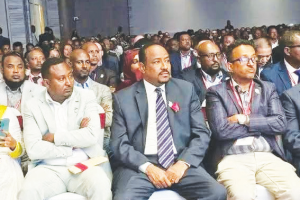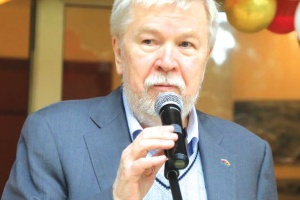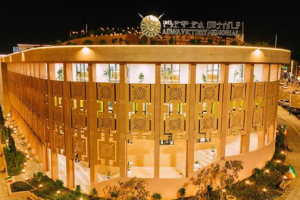BY TEKLEBIRHAN GEBREMICHAEL
Tesfaye Tirfe was a brilliant high school student. He passed his ESLC (Ethiopian School Leaving Certificate) exam with very great distinction and could have easily joined Haile Selassie University in Addis Ababa, but he opted instead to go to Haile Selassie Harar Military Academy where he likewise excelled in all the courses he took including military history, army military science, communications skills, computer literacy, physical training, leadership, defense language, ethics and professionalism, military justice, adventure training, survival training, battlefield terrain, critical thinking skills, etc.
Upon graduation from the Harar Military Academy Tesfaye was commissioned as a Second Lieutenant and was assigned to the military intelligence branch of the Ethiopian Armed Forces. He was therefore privy to a great deal of information classified as well as unclassified, not only on military matters but also on all other aspects of Ethiopian society, including political, economic and social affairs.
As a result, he progressively came to realize that the real strength of a country’s defense forces lies not so much in the quantity and quality of its armaments as in the quality of the military personnel. In other words, knowledge is the source of real power and not force.
Tesfaye believed that this was true in every branch of human endeavor, be it politics, economics, social studies, management, engineering, public administration, etc.
As is well–known, a country’s military is legally empowered to use force in order to defend its borders, and against external enemies that violate its sovereignty and against internal elements that, by their actions demonstrate to work against the territorial integrity and national interests of the country in question.
These are legitimate causes of inter-country and local conflicts and wars. The point here is that in order for the military to prevail in such circumstances, deep knowledge of military science as well as good-quality arms (which themselves are products of knowledge and skill) are necessary. In other words, in the military arena success depends on good knowledge of military science to attain legitimate objectives of victory over external and internal enemies, the latter being usually instigated by the former.
By the same token, success in politics should be determined by knowledge of political science, where the use of force is forbidden and, of course, unnecessary. The practice of political science should be a totally peaceful activity. It is a competition among ideas, the winner of which must be decided by a free, fair and peaceful election.
Political competition is purely a battle of ideas and the sole jury are the people who decide the winners by majority vote, and not by force. Where the level of knowledge of the voting people is rather low, not the best politicians may be elected, but as long as the elections are free, fair and peaceful, the outcomes of popular voting should stand with the hope that the will of the people would be corrected in future elections.
So, Tesfaye Tirfe was fully convinced that the way out of the scientific, technological and economic quagmire that Ethiopia was, and is, wallowing in was a free, fair and peaceful election. Good elected politicians:
- Are knowledgeable in their own field of political science;
- Know that the only reliable way to achieve scientific, technological and economic progress is through knowledgeable and skilled people in all other fields of endeavor;
- Typically assemble a cabinet of highly competent and trustworthy professionals;
- Typically eschew acts of corruption and all other forms of economic exploitation;
- Are fully aware that time is a natural resource in which all types of human progress are conducted;
- Do not usually claim perfection and admit errors when they happen to commit them;
- Typically realize that the true measure of their achievement is the progress in science, technology and economic development they have helped bring about.
Tesfaye Tirfe was mulling and ruminating on all these ideas when he met his course-mate Legesse Teferra, who had just been promoted to the rank of Brig. General on account of his peerless combat skills in dogfights against the invading Said Barre forces. Of course, Tesfaye Tirfe was also given accelerated promotion to the rank of Brig. General for his unparalleled tactical, strategic and logistical skills in ground battles in the same theatre of war.
“Hi, buddy. How are you, my good, eternal friend,” said Tesfaye to Brig. General Legesse Teferra with an informal salute.
“Well, I am O.K, but I am not sure whether military force is any good for the country other than to defend it against external and internal enemies. Knowledge should be the source of political power and not military force,” Brig. General Legesse Teferra said.
“Absolutely right! I will even go as far as saying that the source of military force itself is knowledge!” Brig. Tesfaye Tirfe said.
“How do you mean?” asked Brig. General Legesse.
“Military geniuses like Menelik, Tewodros, Giap, Napoleon, Eisenhower, Macarthur, Montgomery, Patton, Rommel, Moshe Dayan, Mao Zedong, etc. and highly sophisticated offensive and defensive weapons including cannons, grenades, machine guns, mortars, rockets, fighter jets, military drones, missiles, night vision goggles, etc. are all products of natural talent and acquired knowledge and skill,” Brig. General Tesfaye tried to explain.
“You are absolutely right if you mean it in that sense. You might as well add that the interference of military force in the evolution of political power must be universally condemned as it is the “evil of all evils” spawning ignorance, poverty, scientific, technological and economic backwardness,” Brig, General Legesse Teferra said.
“Let’s apply these quite correct observations to the political situation in our country. The bedrock of Col. Mengistu Hailemariam’s political power is the military. Col. Mengistu is a soldier not a political scientist. Hence, his job should be to defeat Shabia and Woyane, which are only guerrilla groups, with his 500,000-strong well-trained and equipped military and hand over political power to an elected government.
But he is not doing that and in fact he is beginning to lose ground to the guerrillas, perhaps deliberately, to enhance the need for the military to stay in power,” Brig. General Tesfaye commented.
“I think military force would be a good adjunct to the right kind of economic policy and strategy for a backward country like Ethiopia in order to make the youth learn and study hard at school and to instill work and ethical discipline and democratic values in the population.
But Mengistu’s cardinal mistake is being wedded to the moribund political and economic ideology of socialism. The dynamo of economic development is private enterprise and competition in a free market,” Brig. General Legesse said.
“Worse still is the emerging fact that he is being beaten at his own profession by rag-tag guerrilla groups,” Brig. General Tesfaye commented.
“Well, the evolving military and political landscape in Ethiopia is a matter of great concern. There is nothing anybody can do about the unfolding danger other than the military. I feel obligated to do something about it although I may lose my life in the process,” Brig. General Legesse said.
“Well, a soldier’s fate is a binary one; either to kill or be killed in a war or any other kind of conflict. Your survival depends on your knowledge of military science, luck and the capacity of the government to replace war by diplomacy,” Brig. General Tesfaye said.
“Let’s vow that we will never betray each other in any circumstances and work closely together to stage a successful military coup against Mengistu,” Brig. General Legesse proposed.
“Agreed without any reservations, buddy!” said Brig. General Tesfaye.
“O.K. buddy, you go ahead and write up our political manifesto. You are more cerebral. I will try to choreograph and coordinate the military, logistical and security operations of the military coup,” Brig General Legesse said.
Then, Brig. General Legesse phoned his clandestine contact in Moscow making sure that there was no possibility of wire –tapping from any direction and said in undecipherable code:
“Hi, this is Alpha speaking. Military coup unfolding in Ethiopia. Coup leaders ready to accept Gorbachev’s offer to make peace with Eritrea on a federation plan. Please pass the message on to President Gorbachev. Over,” Brig. General Legesse said.
“This is Omega replying. Will do as requested. Over,” answered Surgey from Moscow.
Then, Brig. General Legesse secretly met with the Ethiopian security chief, the chief of staff and the commanders of the infantry, the armored, the mountain and the artillery divisions.
Brig. General Legesse told all the high–ranking military officers that Brig. Tesfaye Tirfe and himself were planning to do this for the sake of Ethiopia and not for anything like personal power or advantage.
“You know as well as Brig. General Tesfaye Tirfe and myself that we are being beaten at our own profession by rag-tag guerrilla fighters. We must reverse this shameful situation as soon as possible,” Brig. General Legesse said.
All the division commanders and the Chief–of–Staff nodded their heads in agreement and the latter said:
“The problem lies with Mengistu. By all appearances, he loves Ethiopia, but he loves himself more. He seems intent on hanging to power to death rather than conceding power to his military superiors with a lot more military experience and knowledge.”
Brig. General Legesse stood up and gave the Chief–of–Staff a formal military salute and all the others followed suit.
“Well, Gentlemen, we have taken control of the radio and TV stations. We have secured the support of President Gorbachev. But we have also been informed that Mengistu’s right–hand man Mengistu Gemechu has initiated a secret counter–coup operation by mobilizing the Palace special force. That is a clear and present danger which we must foil without delay,” Brig. General Legesse said.
“The blueprint for the coup is quite satisfactory, but has any one come up with any kind of a political and economic manifesto?” the Chief–of-Staff asked.
“Oh! Yes!” Brig. General Legesse said and produced a small brochure from his trouser pocket and said: “Here are the major objectives: a) constitutional reform; b) holding a referendum on a draft constitution, c) a free and fair election, d) forming an elected government, e) handing power to the elected government, f) drastic land reform with four types of land tenure including private and communal g) promoting a market –based economy, etc. To give credit where credit is due, the manifesto was solely written by my eternal friend Brig. General Tesfaye Tirfe.”
Suddenly, an event one could only imagine to see in an action movie started to unfold. Mengistu Gemechu’s special force surrounded the coup makers and he ordered them to surrender to avoid bloodshed. Hardly had Brig. General Legesse stood up to announce surrender when Brig. General Tesfay Tirfe’s troops surrounded Mengistu Gemechu’s special force and opened fire. In the ensuing mayhem, the coup plotters ran to their respective Jeeps and drove away in all directions.
Brig. General Tesfaye Tirfe spoke into a megaphone, saying: “Let us not kill off our best-trained soldiers. Let us make a truce, join forces and defeat the Weyane and Shabia guerilla fighters.” Mengistu Gemechu walked towards Brig. Tesfaye Tirfe with a stretched arm. Brig. Tesfaye did the same and they both shook hands. But then Mengistu Gemechu’s special walkie-talkie crackled into life announcing: “Weyane and Shabia forces have entered Addis Ababa. Col Mengistu Hailemariam has fled to Zimbabwe.”
The Ethiopian Herald March 9/2021




